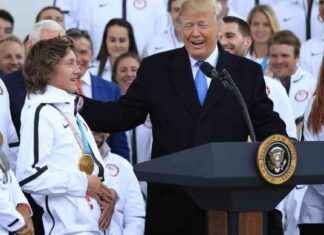Merkel visited Moscow in the midst of Germany’s 16-year-long presidency. Despite deep differences, Merkel tried to maintain close contact with Putin throughout her tenure, who has been at the helm for over two decades.
Friday marked the anniversary of Navalny’s death from a poisoning with a Soviet-developed nerve gas on a domestic flight above Siberia. The opposition leader was eventually hospitalized and was flown to Germany by his wife for treatment. He spent five months in Germany recuperating.
Putin’s most vocal critic, Navalny, claimed that the Kremlin attacked on Aug. 20, 2020. Russian authorities refute this accusation. He was arrested immediately upon his return to Russia in January. He was sentenced to a 2 1/2-year term for violating a suspended sentence from an embezzlement conviction he had received in 2014.
Merkel, speaking after Friday’s talks, reiterated her call for Navalny to be freed, noting that the European Court of Human Rights had condemned his 2014 conviction as “clearly and disproportionate is unacceptable”.
Putin rebutted the criticism by arguing that Navalny was not sentenced for opposition activities.
The Russian leader stated that he was convicted for a criminal offense and not for his political activities. He avoided naming Navalny. “No one should use politics as a cover to conduct business projects that are in violation of law.”
Putin also denied the allegations of a crackdown against Navalny’s aides in the lead-up to Russia’s Sept. 19 parliamentary elections. He tried to turn the tables against the West, as he did before, by pointing out the prosecution of those who took part in the storming of the U.S. Capitol in Jan.
Putin also harshly criticised the West over Afghanistan. He said that the Taliban’s quick sweep over Afghanistan has demonstrated the futility Western attempts to implement its vision of democracy.
He stated, “It is necessary to stop irresponsible police from enforcing its values on others and attempts at building democracy in other countries using outside models without taking into consideration historical, ethnic and religious matters and completely disregarding other people’s customs.”
Merkel encouraged Russia to make use of its contacts with Taliban to push for Afghan citizens to allow Germany to leave Afghanistan.
The situation in Ukraine was another item on the agenda. Germany and France sought to broker a peaceful solution to the conflict between Ukrainian forces, Russia-backed separatists and the fighting that has claimed more than 14,000 lives since 2014.
Merkel plans to visit Kyiv Sunday and made it clear that she isn’t giving up on the hope of making progress in the next weeks in long-stalled peace negotiations in eastern Ukraine.
She stated, “I will continue to work until my last day of office in order that the territorial integrity can be assured”
Putin raised concern at the rising number of ceasefire violations in eastern Ukraine, and asked Merkel to remind the Ukrainian authorities on her upcoming visit that it was important to honor their obligations under the 2015 peace agreement between France and Germany in Minsk (Belarus).
Merkel stated that while we haven’t yet reached the Minsk agreements aims, it is the format we have for talks. She said that she should be careful with the format as long as there isn’t anything else. While every little bit of progress is important, the work that we must do is extremely, very difficult and has had many disappointments.
Putin and the German leader also discussed Nord Stream 2, which will transport natural gas from Russia to Germany. The United States and other European countries have been upset by the project, but last month the U.S. announced that it would be allowed to be completed.
Putin stated that only 15 km (about 9 miles), needed to be completed. He also highlighted that the new pipeline provides a safer and cheaper route for Russian gas supplies to Germany, and other EU countries.
Merkel expressed her desire for Russia to extend its transit agreement to pump gas through Ukraine, after the current deal expires 2024. Putin stated that Russia was ready to negotiate an extension to the deal, but added that details such as transit volumes would depend on European market demand.
The two leaders also discussed stabilizing Libya, Syria and efforts to revive the Iranian nuclear agreement. They also discussed developments in Belarus where the authoritarian President Alexander Lukashenko has been relentlessly cracking down on dissent. Lithuania, Poland, and Latvia have all accused Belarusian authorities with encouraging migrants to disrupt the EU.
Merkel, 67, was born in communist East Germany, and speaks fluent Russian. Merkel has always maintained that Russia’s relations can only be improved through dialogue.
Since she will not be running for the German national election next month, her visit to Moscow could be her last trip abroad as chancellor. The outgoing government will remain in place until a new one is created, so it’s unclear when she will be stepping down.
Putin, now 68, can speak fluent German, which he learned while serving in East Germany’s Soviet KGB secret agency in the 1980s. He acknowledged Merkel’s contribution to the development of Russian-German ties, and stated that she would always be welcome to visit her after her departure.
He said, “Germany is one our key partners in Europe as well as the whole world because of your efforts over 16 years.”
Merkel stated that even though there are deep differences between us today, we still speak to one another — and this should continue,” she said during Kremlin talks.







